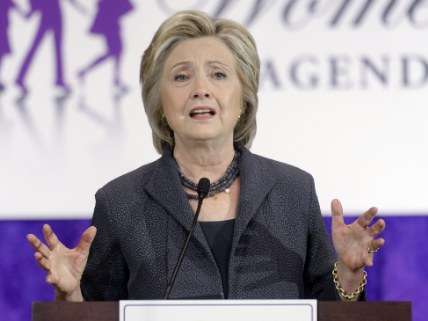'Trump Bad' Is Not a Good Enough Argument to Discourage Third-Party Votes, Democrats
Refuse to actually engage with the reasons the electorate dislikes Clinton and she might lose.


According to The New York Times, the Democrats and the Hillary Clinton campaign are keenly aware that they are losing votes to third-party candidates, especially the votes of the under-35 crowd. Well, good for them for noticing! So … how are they approaching this problem? Let's see:
"We'll be launching a multimillion-dollar digital campaign that talks about what's at stake and how a vote for a third-party candidate is a vote for Donald Trump, who is against everything these voters stand for," said Justin Barasky, a strategist for Priorities USA.
Mrs. Clinton may also get an assist from one Democrat who has been largely quiet about the race, but can testify to the importance of resisting the third-party temptation: former Vice President Al Gore. Her staff has had conversations with aides to Mr. Gore about bringing him onto the campaign trail to emphasize the importance of supporting Mrs. Clinton if they want to make progress on combating climate change.
Oh … well, this is going to fail miserably. There are indeed some elements of this election that are beginning to look an awful lot like the George W. Bush/Gore match-up that saw third-party candidates pulling off a number of votes in a close race. At least it feels that way at the moment due to the narrowing of the poll numbers separating Clinton and Trump.
The strategy detailed above suggests that after all this time, the Democrats have still learned not a single thing about the behavior of third-party voters. And it suggests that, just as with Gore's loss, should Clinton fail come November, there are going to be a number of people who will blame those who refused to comply with the demand that they fall in line with the major parties.
The people who don't vote for Clinton will be blamed for Clinton's loss, which, while I suppose that's logically true, is ultimately a way for party leadership from having to face the fact that they've lined up behind a deeply unpopular, unlikeable candidate with a reputation for secrecy, dishonesty, and corruption, and then wondered why their campaign calling Trump secretive, dishonest, and corrupt didn't work.
Back in 2013, when some Republicans were upset that a Libertarian Party candidate was going to impact the outcome of the Virginia governor's race, I wrote a short piece about the mentality of third-party voters. This was an effort to try to get the establishment-oriented Republicans and Democrats to avoid the trap that the Clinton campaign appears to be falling into: treating third-party voters as though they're wayward partisans who are acting out and need to be brought into line.
During the Republican Primary, I brought those points back to help explain the behavior of Trump's supporters, who were voting in a manner very reminiscent to those who turn to third parties. They were not interested in supporting the Republican Party's favortie candidates and did not care if their decision ultimately helped Hillary Clinton come November. They were not party loyalists. Whether their grievances were supported by reality or not, they felt betrayed by the Republican establishment.
Looking over this list of third-party voter analysis, it's easy to make a case that it all still applies to this national election. Anybody trying to get third-party voters to pull the lever for Clinton or Trump (but especially Clinton), needs to absorb this mindset:
We don't like your candidate. I remain mystified every single time I have to bring this up. Clinton is probably the most disliked candidate that the Democratic Party has put forward in contemporary times. Trump, of course, is also extremely disliked. The result here has been an argument over which candidate is worse and disdain and condescension directed toward those who suggest that they're equally bad or somehow both equally undeserving of our votes.
But the mentality of a third-party voter rejects the debate over which of the two candidates is worse. Once the voter decides neither candidate is worthy of their vote, they do not care that a third-party choice superficially "helps" one candidate or another. Third-party voters do not want Clinton to win. While it's also true that they don't want Trump to win, that's a side effect of voting for Clinton that they're willing to accept. Why? Because they don't want Hillary Clinton to be president.
Accept that, Democrats. Internalize it. Third-party voters do not want Clinton to win. They don't care that you sneer at them over it. You are not entitled to their support.
You need to make the actual case for your candidate. The Clinton campaign does actually have a lot of policy-focused content, but the campaign itself seems heavily focused on how bad Trump is. Note that the example above is about bringing in Gore to promote a climate change-fighting platform, which may appeal to some potential Jill Stein voters.
But for likely Gary Johnson voters, Clinton has a problem. A lot of positions and issues that push libertarian-leaning voters away from Trump also push them away from Clinton. She has embraced trade protectionism and massive government spending increases in order to land votes. Trump has done the same. Clinton is a foreign interventionist in a time where voters are tiring of war. Trump promised to become less involved in foreign entanglements (though I'm not sure anybody should believe him here). Trump has literally promised to spend twice as much money on government projects than Clinton.
I've reported on Clinton's policy proposals for LGBT issues and separately for tech issues. Both her memos in these areas call for significant increases in federal laws and regulations, and her tech platform will be a magnet for high-level lobbying and cronyism. These platforms were clearly written by those with the most influence on her campaign and ultimately help feed the attitude that she's just a candidate who will do anything to get her hands on the reins of power. When she competed against Barack Obama in 2008, she focused on her policy differences with him as candidates. Now, eight years later, she's running as his third term. Colin Powell described her in an email as having "unbridled ambition" and as being "greedy" and "not transformational." Frankly we could use more presidents who don't want to use the office to transform the country, but we're in a state now where the status quo is an extremely powerful executive branch that has little accountability. "Not transformational" means the perpetuation of that status quo. Why would a third-party voter support that?
Don't presume to tell us what we believe. Insert a "basket of deplorables" reference here. Granted, this is a push for third-party voters rather than for Trump supporters, but there is still a significant problem that this campaign's attitude toward non-supporters is to attack them. Even those who don't support Trump at all were certainly put off at a presidential candidate openly writing off millions of Americans as bad people.
This behavior is a reminder that there are a good chunk of people on the left who have concluded that those who don't agree with their policy prescriptions are bad, selfish, racist, or evil. There will be no debate over whether policies suppress citizens' rights to free speech, expression, or religion. There will be no debate over whether these policies lead to corruption and cronyism within government. There will be no debate over whether these policies are even effective.
Instead there will be baskets in which we will all be dumped into. Libertarians are used to it by now. Should Clinton lose, we'll be expecting more of the same.
No really, don't pull the blue versus red crap on us. Hilariously, I don't think this is going to be as big of an issue with this race partly because Trump's nomination has disrupted the very idea of what the Republican Party even is. Furthermore, as mentioned earlier, Clinton's and Trump's policies—particularly on domestic matters other than immigration—are not that terribly far apart.
Respect that voters determine their own political priorities. I think this is the one area that the Clinton campaign is at least paying attention to. Certainly the bones she's thrown to Bernie Sanders supporters on minimum wage increases and college subsidies indicates she knows which way the wind blows. And that's Clinton in a nutshell: Her career is based on pursuing political power through the path of least resistance.
Yet, this seems in itself likely to push away voters who aren't economically illiterate and have nowhere else to turn. If economic growth matters to you, why would you vote for either Clinton or Trump? Unless you believe Clinton has no intention of wreaking the economic disaster she's promised far left voters, why choose her over Trump?
The "Trump is worse" argument fails to engage here, and the campaign still feels like it's pushing for a get-out-the-vote effort for liberals and progressives, not actually trying to appeal to third-party voters.
It's the Republican Party's fault that Trump landed the nomination for the presidency. It will be the Democratic Party's fault if he actually wins it. Clinton supporters have not given third-party voters much to work with but sneering condescension, stale big-government policies that encourage cronyism and corruption, and an attitude that those who don't support her are refusing to do so because they're selfish, bigoted, or sexist and not for any number of legitimate reasons.


Show Comments (76)